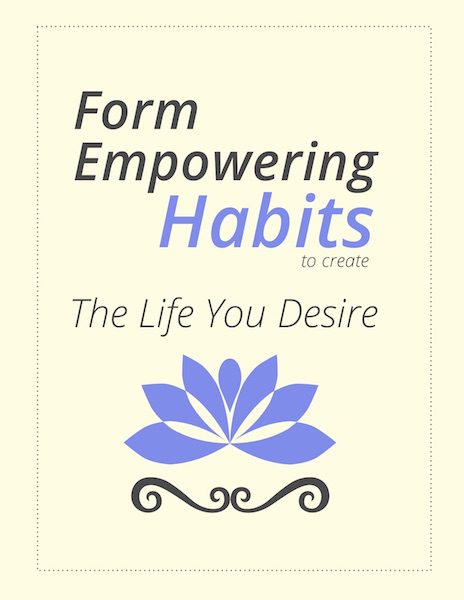How you go about your daily routines ultimately determines the life you live. How can you fill your life with abundance and fulfillment? How can you create the life you truly desire?
The answer is to form empowering habits that ensure you live the life you seek.
Habits are Critical to Creating the Life You Desire
Life is all about your habits: Form Empowering Habits
1. Daily routines, or habits, makeup most of your life. What you do every single day over and over again combines, over time, to become the very foundation of your life.
2. Habits are automatic behaviors. When you develop a habit, it takes that action out of the realm of having to make a conscious choice every time you do it. You don’t have to think about it or make yourself do something once it’s a habit. You just do it automatically.
3. Habits can be empowering or inhibiting. Positive habits help you get what you want while negative habits hold you back, preventing whatever you want from ever happening.
4. Positive habits create the life you desire. If you form positive habits, you’re more likely to enjoy the riches and fulfillment of the good life you want.
Your habits are the most basic elements of your life. Whether you look at your day-to-day routines or your overall life, it’s made up of all the behaviors you do. Those actions practiced consistently are your habits. So if you establish positive, empowering habits, you’ll live the life of your dreams. Form Empowering Habits

The Science of Habit Development
New research by Phillippa Lally and others at University College London has truly shed light on the science behind habit development. Form Empowering Habits
Here are the results of their research and some suggestions for creating new habits based on their findings:
1. A behavior must be repeated 66 times consecutively before it forms a habit. If you’ve ever tried to establish a habit by performing a behavior every day for 14 or 21 days, it probably didn’t work because you didn’t do the behavior enough times in a row in order to successfully develop the habit. Try it again, but this time for 66 days.
2. Repeat the behaviors in the same setting or situation. You’re more likely to form a habit when you keep doing a behavior in the same place and/or situation. Where you are affects habit formation.
> In essence, if you’re in the same place when you’re doing the new behavior over and over, you’re more likely to successfully form a habit.
> Ideally, perform your behavior in the same room for the first 66 days. Whether you do the behavior in your home, office, or elsewhere, keep it in the same locale at first, and then you can expand to apply it in other places after you’ve established it as a habit.
3. Forming a new habit is “cue-dependent.” Whetheryouforma habit depends somewhat on cues in your environment and behaviors. There are 2 types of such cues, according to Lally and the other researchers: situational and contextual.
> Situational cues originate from your environment or location while contextual cues are other behaviors you do in conjunction with or related to the new behavior.
> An example of a situational cue is what you see in the morning when you first enter your kitchen: you see your coffeemaker and then make some coffee. Your coffee maker is, therefore, something that triggers you to make your morning coffee, which you do every morning (out of habit).
> An example of a contextual cue in this case of morning coffee is that as soon as you shut off the alarm and put on your robe, you head to the kitchen to prepare your coffee. Getting up and putting on your robe trigger you to go make your coffee. Form Empowering Habits
4. Consistency is an important key to establishing habits. Results of the research also emphasize the importance of consistency when trying to form a habit – especially at the beginning stages of creating the habit.
> Although the researchers found you could skip a day when trying to establish a habit, it’s unknown how many total days you could skip during the 66 days and still successfully form a habit.
> During the studies, those who skipped days initially during the 66 day period were less likely to successfully establish a habit. One could theorize that you’re setting up your brain to become accustomed to a habit early on in the process.
> Make a pact with yourself to repeat the behavior for at least 66 days without fail. Start the new behavior at a time that you’re fairly sure you can repeat the desired behavior without interrupting your new routine.
5. Pair the new behavior with one you already do regularly. For example, if you want to start flossing your teeth, lay the package of floss right beside your toothpaste, or even on top of it, to be reminded to floss after you brush your teeth. Be consistent about flossing your teeth every single time you brush them.
Focusing on what you really want it life and developing habits that support those goals will ensure you live the life you seek. Applying the information from this research will help you succeed in developing these new, positive habits.
Let’s take a look at negative habits and their consequences, substituting positive habits for negative habits, and developing new, empowering habits. Form Empowering Habits

Negative Habits and Their Devastating Effects
Consider the habitual behaviors you exhibit that eventually lead to unwanted, negative situations in your life.
Negative habits can produce results that are completely contrary to what you desire.
You wouldn’t consciously choose to keep yourself from what you truly want. But you keep repeating those habits anyway just because they are what they are: habits.
Honestly evaluate how what you’re doing is affecting your life. Maybe you haven’t achieved your work goals or your health isn’t as good as it could be because of your negative habits. Form Empowering Habits
Subconsciously or even consciously, you experience some type of benefit from continuing to perform these negative habits and that’s one reason you continue them. But is that benefit more important to you than what you’ve dreamed for your life?
CASE VIGNETTE #1
Tom wants to play basketball with the men in his neighborhood who get together every Saturday at 10 a.m. He used to love shooting hoops in college and for a few years afterward when he first started working. He was also in better physical condition then.
Even though he talks all the time about wanting to get back into shape, it’s a challenge because Tom is now 30 pounds overweight and already struggles with high cholesterol. After work during the week, Tom’s just too tired to do anything. And he loves to sleep in on Saturdays.
Tom feels entitled to stay in bed on Saturday mornings after getting up at 7:00 a.m. to go to work all week. So, he sleeps late — until around 9:00 a.m. Then he has his favorite breakfast: sausage, gravy, and biscuits with 2 glasses of milk, a glass of orange juice, and a banana. By the time he prepares and eats his breakfast, he’s in no condition to play basketball.
In this example, what are the benefits to Tom to keep repeating his Saturday morning habits? How is he being reinforced to continue the behaviors that are actually keeping him from what he truly wants?
1. He gets to lie in bed longer, which he apparently longs to do.
2. Tom loves the tastes of his breakfast. It feels decadent to him to eat a breakfast so full of fat, calories, and flavors. Frankly, it just tastes good. Form Empowering Habits
3. There are no real demands on him during this time. He doesn’t have to get dressed, go out, or accomplish anything.
4. Tom deserves it. He’s convinced himself he deserves to lie in bed as long as he pleases, eat his unhealthy breakfast, and choose not to play basketball. Emotionally, he sends himself the message that after working all week, he can behave however he wants, regardless of the consequences long-term.
The fact is that Tom’s Saturday morning habits of sleeping late, eating a breakfast loaded with calories and fats, and avoiding playing basketball set the tone for his entire week and maybe even his life!
Tom has consciously convinced himself he’s doing what he wants. But is he really? After all, he’s repeating a series of bad habits.
Which would he truly choose — being in good physical condition by playing basketball and hanging out with the guys on Saturday morning or continuing to stay in the shape he’s in?
Your turn…
Take a minute or two to ponder the situations in your life you’d like to change. Are you like Tom — engaging in negative habits from which you consciously or unconsciously derive benefits?
How are you reinforcing your unsavory habits? What do you say to yourself that encourages you to continue repeating these actions? Form Empowering Habits
If you see a bit of Tom in yourself, you might want to begin consciously focusing on the things that are more important to you to obtain a different, more pleasing result.
You’ll benefit even more from establishing a positive habit than you derive from repeating a negative habit.

Substitute Positive Habits for Your Negative Habits
To interrupt a negative habit, you could substitute a positive habit. Basically, you’re replacing an old, negative habit with a new, positive habit. Those positive actions will aid you in achieving the results you want in life.
Considering Tom’s scenario above, let’s apply this information. Form Empowering Habits
Tom’s best bet is to realize the effects these habits are having on his life. Once he consciously connects with the damage he’s doing to himself by practicing these habits and decides that he truly wants to change, he can then begin work to build the life he truly seeks.
He can replace his negative habits with positive ones. To do this, Tom can:
1. Set his alarm on Saturdays for 8:30a.m. He’ll still get an extra hour and a half of sleep.
2. Choose to eat a smaller breakfast of one piece of sausage, one biscuit, and one egg to experience the flavors he truly enjoys.
3. Show up to play basket ball with the guys at 10:00 a.m.
4. Allow him self a couple of hours to rest after he shoots some hoops.
5. Repeat this behavior every Saturday consistently for 66 times. In the least, Tom should avoid skipping Saturdays during the first months of his new behavior.
6. Ensure he’s home on Friday nights so he’s in his own home (the same location) on Saturday mornings.
7. Establish situational cues to trigger him to perform the positive behaviors that will lead to habit formation. For example, Tom can lay out his basketball clothes and shoes so they’re the first things he sees when his alarm sounds.
Apply this type of thinking in your own case. Read the next hypothetical vignette and review the steps to changing behavior from a negative habit to a positive one.
CASE VIGNETTE #2
Maybe you want to be healthier and lose a few pounds. But for the last several years, you’ve taken the no-fuss, easy way out at breakfast time. You started your day with a cinnamon roll or doughnut. It’s an easy breakfast and you can just reach for it and go.
How can you change this continuous loop of starting your day off with a negative habit to doing something that leads to your good health— a positive habit? Form Empowering Habits
1. Acknowledge to yourself that your cinnamonroll /doughnut habitis a negative habit. It’s something you do over and over again, even though you feel you shouldn’t.
> Consciouslyconnectwhatyou’redoingtoitsnegativeeffects, which in this case could be high cholesterol, excess pounds, and late morning headaches due to a lack of protein and overload of fats and carbs in your morning “meal.”
2. Consider ways you can replace your negative habit with a more positive habit. Ask yourself, what could I do instead?
3. You could stop buying cinnamon rolls and doughnuts. If they’re not in the house, you won’t engage in this habit.
4. Try purchasing fresh fruits of your choice that are quick and easy: bananas, pears, and apples, for example. When you substitute “positive” foods that could help reduce your cholesterol and help you manage your weight better for your baked items, you’ll eventually develop a positive habit that takes the place of your negative one.
5. Place fruit in the area where you used to keep your cinnamon rolls and doughnuts to set up your situational cue, which is the sight of the fruit. Also, you can’t perform your negative habit (grabbing a doughnut or roll) if the source of it is gone.
6. Choose a fruit to eat every morning. Continue this behavior every day without deviating from your new plan for at least 66 days in a row. If you do, you’ll form a positive habit that replaces your old, negative one. At the very least, skip no days of eating fruit for at least the first half of the 66 day period.
You can successfully replace a negative habit with a new, positive and empowering one. Applying the above process to your own situation will help you wipe out old habits that inhibit you from living your best life. Form Empowering Habits

Develop New, Empowering Habits
There may be times when you don’t have a negative habit that thwarts you from achieving your goals. However, you still may want to hasten the pace at which you move forward to attain them. In this situation, you can develop new, positive habits that support your intentions and automatically lead you right toward your goal.
Once a positive action becomes a habit, you’ll do it automatically without even thinking about it. So positive habits make it easier for you to create the life you desire.
CASE VIGNETTE #3
Here’s another hypothetical case vignette to illustrate how you can develop a positive habit:
Suppose you want to become an expert in your field so you’ll receive a promotion at work and make more money. Although you really enjoy your job, you’ve never really invested any of your personal time in your career. You don’t read journals, trade magazines, or even brief articles or blogs on the internet about your field.
How can you expand your professional knowledge and horizons?
Examine these suggestions:
1. Subscribe to a professional or trade journal in your field. It’s important to have tangible evidence of your goal to become an authority in your field. Place books and journals on a coffee table and your bedside table. These are your situational cues to devote time to your study at home.
2. Schedule time in your day to read about yourprofession and explore trending topics related to your job. Even 30 minutes each day will whet your appetite to delve more into your profession and the specific areas that interest you. If you can, establish your study time to occur at the same time, say from 7:30 to 8:00 p.m. during evenings at home.
3. Join a local business organization that addresses your type of work. Attend the meetings consistently, whether they’re weekly or monthly. Remind yourself you’re working to establish the habit of cultivating your work interests to be more successful and achieve your goals.
4. Engage in activities to cultivate your special interests. Checkout library books, meet co-workers for coffee to discuss work for an hour a week, and surf the internet to see what’s going on in your profession.
Starting new behaviors that you want to develop into a positive habit takes a certain amount of self-motivation, focus, and effort on your part.
As you can see from the above illustration, if you want something badly enough, you must take action by performing behaviors repeatedly and consistently. Then, you’ll establish positive habits that will lead you to the life you dream of.
Summary
Recognize how your habits impact your existence. Your entire life is made from the cloth of all the habits you perform day after day, week after week, and month after month. When you work to establish positive habits related to your goals, you’ll be more likely to obtain the life you seek.
Research regarding habit development reveals that you must repeat a behavior 66 times, ideally, consecutively (without skipping) in order to establish a habit. If you learn to set up situational and contextual cues to trigger you to do the new positive behaviors, you’ll be more successful in forming positive habits that will provide you with the existence you desire.
Consider how your negative habits negatively affect your life. Be honest with yourself about the results of your behaviors. Then, take conscientious steps to replace your negative habits with more positive ones. Also, work to establish positive habits using the research on habit development.
When you include your life goals in your daily routines by forming and continuing positive, empowering habits, you’ll create the life you desire.
